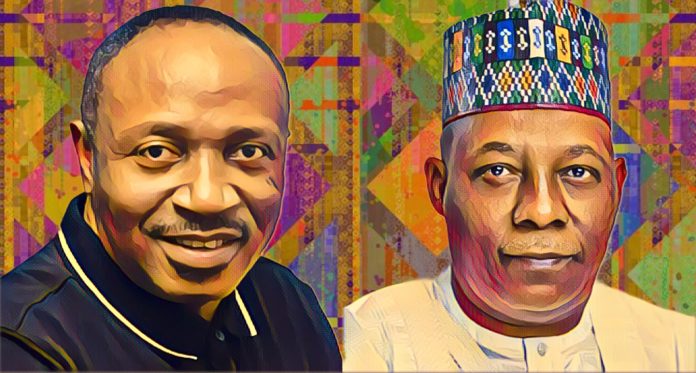KEY POINTS
- Shettima should be focusing on issues that can be useful, not Kemi Badenoch — Atiku’s aide.
- Shettima had also criticized Badenoch for negative comments about Nigeria’s governance .
- Badenoch’s Yoruba roots don’t make her obliged to praise Nigeria, Shaibu argued.
Nigeria’s Vice President Kashim Shettima is being urged to expend his energy elsewhere by Atiku Abubakar’s spokesperson Phrank Shaibu, who has told the vice president to rather be spending time on more productive matters than criticising Kemi Badenoch, the leader of the UK’s Conservative Party.
His statement follows Shettima’s criticism of Badenoch’s comments about Nigeria. The vice president had accused Badenoch of disparaging her country of origin and suggested that, if she had no pride in Nigeria, she could ‘remove the Kemi from her name’.
Responding, Shaibu called out Shettima for prioritising other things. Badenoch’s Yoruba roots and Nigerian heritage should not be a reason to criticise her, he argued.
“Those criticizing @KemiBadenoch should take a moment for self reflection.” And just the fact that her name is Kemi or she is Yoruba does not make her Nigerian. According to him, Arsenal’s Gabriel Jesus, who isn’t the son of god is not an exemption.
Shettima should find something more productive to do with his time than debating Badenoch’s comments, he added.
Explaining the Badenoch–Shettima controversy
The controversy kicked off after Kemi Badenoch, who has Yoruba roots, spoke critically of Nigeria’s governance while trying to assume leadership of the UK Conservative Party. ‘Insecurity, corruption and fear hounded my journey, and they have contributed to the way I see leadership,’ she said.
Some Nigerian politicians, including Vice President Shettima, did not like her comments, accusing Badenoch of darkening the image of her home country.
While Shettima conceded her right to free speech, he said she has no right to devalue Nigeria like that, adding: ‘If she is as ashamed of Nigeria as she put down, she might as well remove the Kemi from her name.’
‘I don’t owe Nigerians a PR campaign that they are not prepared to do for themselves,’ Badenoch replied, standing her ground. Political figures were swift to react to the incident, with Nigerian leader, Phrank Shaibu, asking Nigerian politicians to stop the debates with foreign politicians and instead focus on the pressing issues that Nigerians and Nigeria is going through.
This zooms in on a greater discourse around the role of Nigerians in the diaspora, and what they owe their country, and whether that includes having loyalty or patriotism to the country even when in powerful positions in the diaspora.



